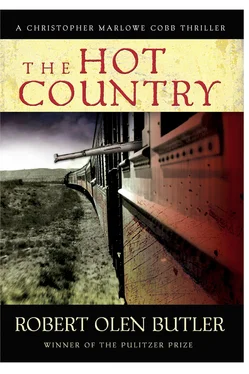I felt a few small items slough away and remain inside. It couldn’t be helped. I had to deal with them later. The stack was free and I set it down on the desktop. This packing job was the work of a meticulous man, a careful and suspicious man. That was my fear. That it would be impossible to prevent such a man from knowing someone had gone through his things. Perhaps it wouldn’t matter. If I found out what I needed and did it before he returned, perhaps it would be all right. He didn’t know me and I’d stay out of his way and I’d do what I needed to do here and slip away. But I at least had to try to conceal what I was doing. If I concentrated, perhaps I could replace these things so he’d never know. Unless he was meticulous to the point of obsession.
I realized sweat was dripping from my forehead, and my heart was pounding in my throat. I’d ignored my body’s awareness of the time slipping onward and of the possibility he could walk through the door at any moment. I would have to ignore it again.
I began to lay his things aside so that I could relayer them when I put them back, as if they’d not been touched. His shirts. His woolen socks. His underdrawers, which were made of silk. Which I handled as if they were rotten fruit. His handkerchiefs. Another pair of riding breeches. And in the center of all this, a six-inch, no doubt keenly sharpened knife, pointed in the direction of the top opening of the bag. The little surprise for the prowler, as I suspected. And on and on. The usual stuff. A small rubber bag with medicines: quinine, calomel, Sun Cholera Mixture in tablets. His toothbrush. A union suit. And I went back into the bag and withdrew the sloughed-off items.
Three bars of soap. In delicate wrappers. Smelling strongly of lilac. Were these soaps his choice? Was this a side of Friedrich von Mensinger that he’d better keep hidden from Villa? Or were they specially given him by Anna, his Anna who loved him in spite of his striking her in public, twice at the Stadtgarten for her sympathetic tears, which meant he struck her often, in public and in private. She gave him these soaps and he still had them. If he scorned them when she gave them, he would have no doubt told her so and struck her again or at least thrown the soaps at her feet. If he scorned them but while he was in a placid mood, which even a man who beat a wife could find himself in now and then, if he scorned them but took the soaps, he would have disposed of them long before this. But he took them and he kept them and he waited, perhaps, for a chance to use them. Would he feel close to his wife when he did? Men who beat their wives could embody this paradox also. To wish to hurt them and yet, at times, to feel sentimentally nostalgic over them. I’d seen men do this to women. To my mother. She’d spoken of this paradox. She spoke of it and found nothing in Marlowe or Shakespeare or Sophocles or anyone else to quote so that she could express this paradox, and she thus spoke of it to me strictly in her own words, with no quotations to help distance her from whatever complex feelings she was having and I clenched at Friedrich von Mensinger’s briarwood pipe, which I now found in my hand and which I would snap in two if I didn’t control myself and stay focused on what I was here for. So I controlled myself. And I focused. And I was keenly conscious that time was slipping away and I was not finding any papers.
There was another side to the bag.
But first I carefully restacked the items I’d already withdrawn, leaving everything restored on the desktop, ready to be inserted later. All but the soaps. I didn’t know how they’d been arranged on top. But he couldn’t possibly read anything from them. They would have shifted from the jostling of the ride. If there were clues for Mensinger, they were in the arrangements of these other items. I’d done the best I could.
And now the other side of the bag. I opened it. I withdrew the items as a single unit. I once again peeled back and set aside layer after layer of Friedrich Mensinger’s quotidian life. His carefully folded white linen suit. His shoes wrapped in a towel. His clothes brush. And more. And more. And there was no Papiere . There were no documents. No papers.
I restacked this final collection of Mensinger’s meaningless stuff.
Everything from the saddlebags sat upon the desk in two piles. I took a deep breath. And I heard a thump. A sound from outside. I straightened. I stopped breathing. I could simply bolt in the other direction, to the joined end of the car. There was another door, another platform, a way out. Unless it was locked. But now I heard laughter beneath the windows. Passing. Two male voices now. Speaking Spanish. Two drunken Villistas.
He could have taken the papers out. He could have hidden them separately. I turned around. I looked to the bunks. To the bedding. To the stove. Perhaps inside the burner of the stove. I was about to move to these places but I thought of Mensinger’s saddlebags once more. One more possibility.
I picked up the bags, one compartment in each hand.
One side was heavier than the other. The first side I searched.
I laid the bags down. I opened the heavier side and looked at the top stitching. Nothing unusual. I ran my hand to the bottom. I pressed my fingertips as far in as possible and then bent them downward. The inner wall was one large flap. I ran my hand along the bottom of it and at the far left I found a heavy button. I undid it. I moved my hand along the bottom edge to the far right and I found another button. I undid it. I pulled the flap out of the bag. I reached back inside and I found an inner compartment, shallow but sufficient to hold the thing I drew out. A thin, leather document portfolio.
I had him. I cleared the space beneath the lamp. But time was the thing. I had to keep that in mind, but I had to slow down now. I slipped the leather flap of the portfolio out of its loop and I opened the cover.
I ran the fingertips of both my hands in the leather margins surrounding this little pile of documents. There were several things here. Heavy paper. I lifted them out. I had to be obsessively meticulous now myself. If I’d inadvertently, inevitably left him some little clue in his personal items that someone had been here, I could at least make him think the intruder did not find the papers. But I was suddenly keenly aware once more of the beating of my heart, each beat marking time, like the ticking of a clock in a world sped up. These seconds were rushing now, these minutes. I thought: I should just take the papers. Take them and get on my horse and ride away. I could not only write a story but produce the documents themselves, could give them to the U.S. government.
And now I felt the sudden demand to define myself. Or to redefine myself. I was a reporter. I’d already stretched the boundaries for a reporter. But not by the standards of most of my colleagues in the business. The Hearst men. The Pulitzer men. They would do anything for a story. I’d already done more than I’d expected. Here I stood in this man’s quarters, rifling through his private things. Intervening was another matter. Richard Harding Davis would intervene. They all did in Cuba. They all worked up a dandy little war of their own, all at Mr. Hearst’s bidding. And taking the papers wouldn’t change Mensinger’s intentions. It would come out that the American stole these things and perhaps simply give weight to his arguments. And the story itself, without my actually stealing the documents, would be just as good. A story about what Germany was trying to do. What Mexico might do. Bring it into the public light in a newspaper.
I kept the documents in my hand but I centered them in the bright, immediate arc of the kerosene lamp. Voices. I straightened up again. Spanish. Mensinger spoke Spanish. But I knew his voice now. Pinched. Sucked through his nose. The superior man speaking the inferior language. These voices passed. They were not him. I bent to the documents. I needed to read them quickly, get their gist, a flavor of their phrasing. Needed to apply my best quote-gathering frame of mind.
Читать дальше












